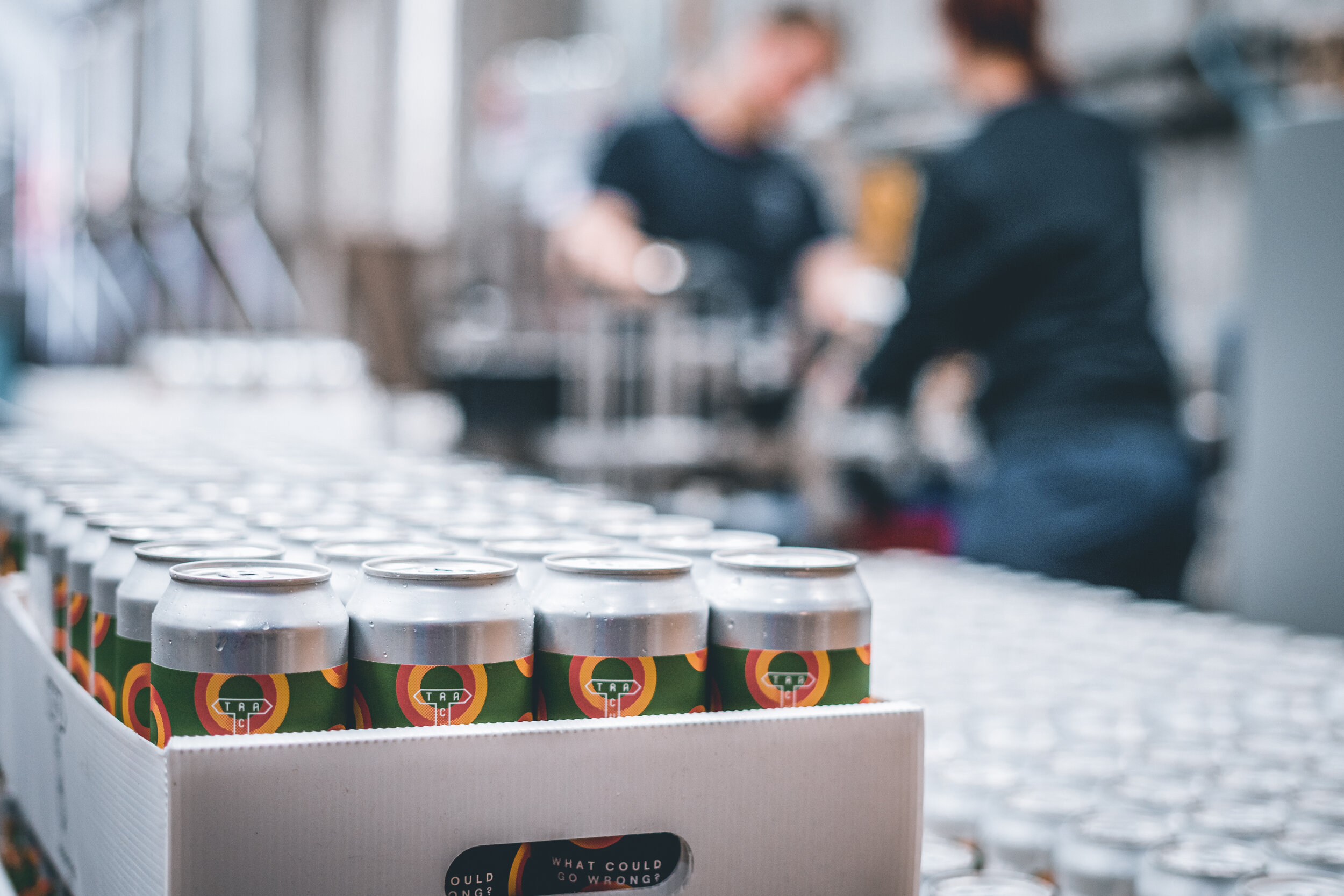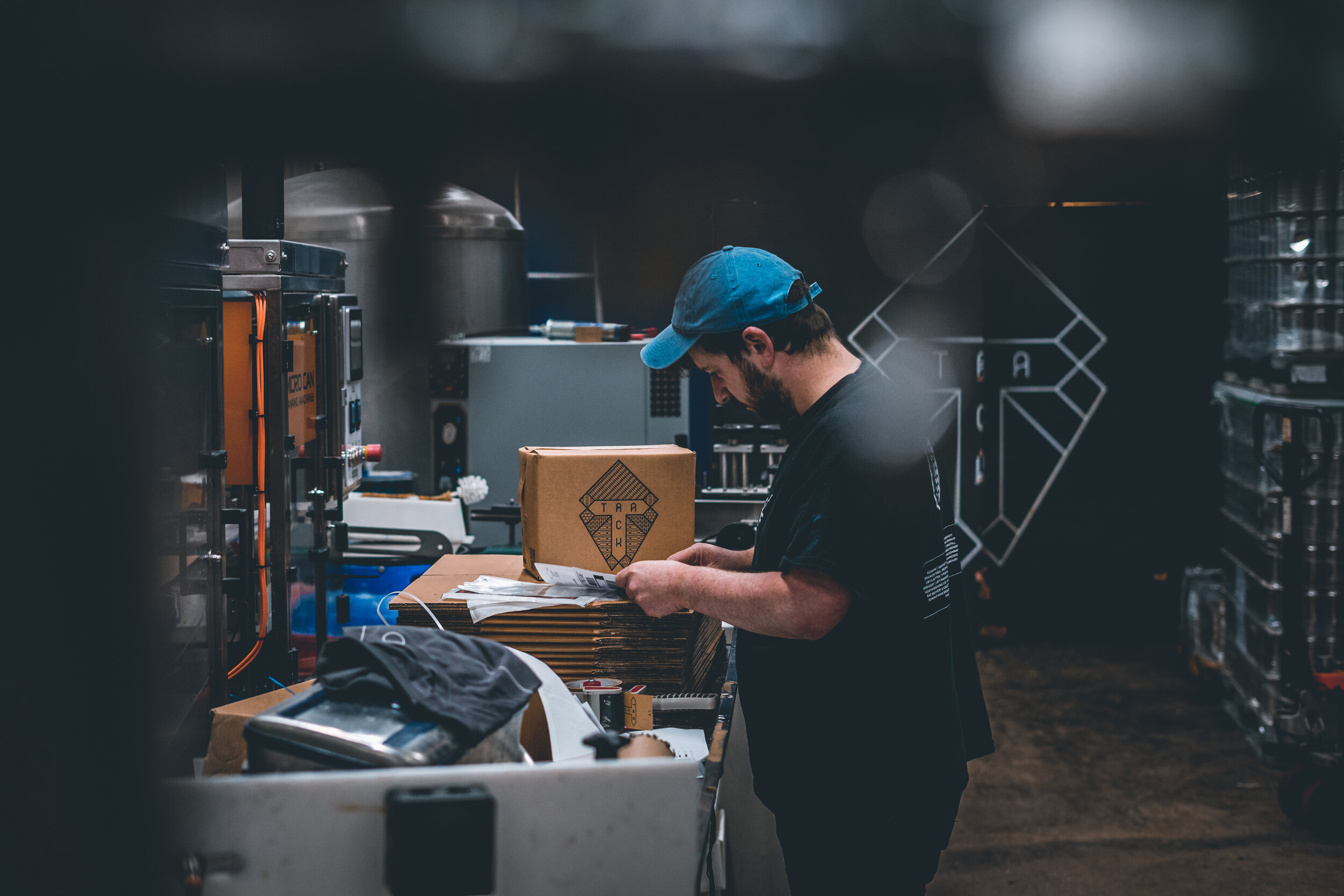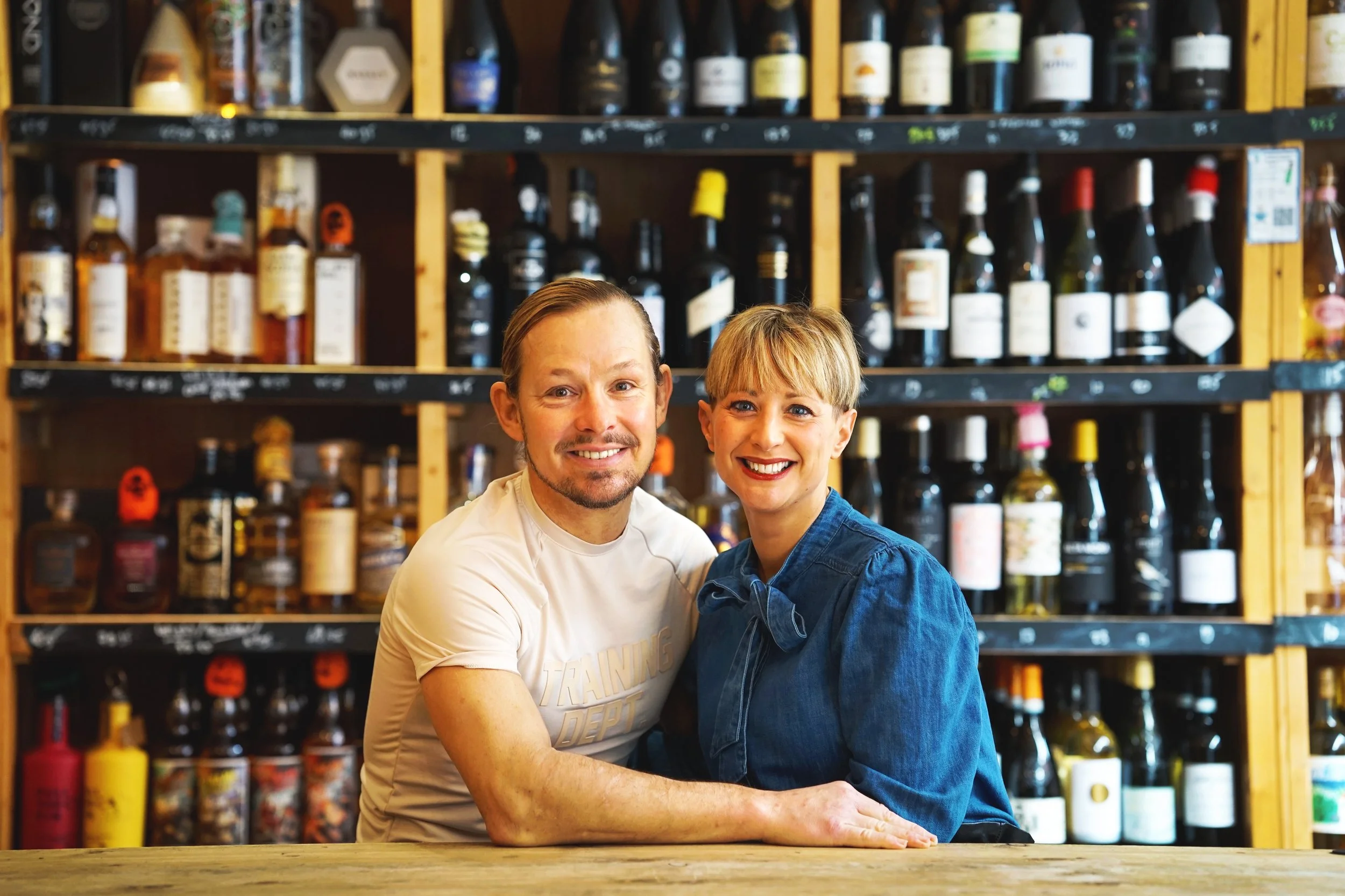After the Gold Rush — Catching up with Manchester’s Track Brew Co.
Manchester’s Track Brew Co. has always been in motion.
Introducing American-style pale ales and IPAs with what founder Sam Dyson describes as “a bit of wallop” to Manchester drinkers has been his aim since he launched Track in November 2014. This was after he’d cycled tens of thousands of miles through the United States, South America, Australia, New Zealand, and mainland Europe.
Photography by Stefan Melbourne
What began as a trip in 2008 to visit his uncle in San Francisco became a liberating odyssey of travel and adventure and beer, where—in particular—he fell in love with the West Coast’s “heavy, malty but hoppy, resinous and bitter” beers that would fill his glass with after a long day on the road. It was unlike anything Sam had experienced before, and America’s take on the IPA suddenly became the focal point of his travels.
“Beer was a common factor in all of it,” Sam tells me. “After cycling a long way and ending up in these incredible, beautiful places, the first thing I’d want to do is have a beer and stare at where I’d got to. I had some very good nights on New Belgium’s Fat Tire, and I was fortunate enough to drink Russian River’s renowned Pliny the Elder. The photographs progressed from mountains and lakes and my bike to bottles of beer strewn around campsites.”
Sam, who grew up in Chester, got his first taste of the beer industry working at Camden Town Brewery in London before returning to the northwest to set up Track. It wasn't long after he opened that the Manchester craft beer scene really began to take off. My first experience of Track was in January 2018, when their charming but minuscule taproom was just a couple of rows of tables and chairs nestled among their brewing vessels under the railway arches on Sheffield Street, right behind Piccadilly Station. A few doors down was Cloudwater’s barrel store, which doubled as a makeshift bar at weekends, and those in the know would flit between the two in what otherwise felt like you were in the middle of nowhere in the industrial heart of Piccadilly.
Track’s first taproom was straight-forward and unassuming. Here, they let the beers do the talking. I still remember that first sip of Circle Work—an intense, full-bodied yet impossibly easy-drinking double IPA, brewed in collaboration with Leeds’ Northern Monk—that felt to me like an initiation into what was, at that point, a largely unseen world. One where fresh, ever-changing beer was served from its source by those who made it, and what was in your glass was more important than your surroundings.
***
Before his trip to San Francisco, Sam admits he was more used to drinking the likes of Old Speckled Hen or Badger Tanglefoot, so it blew him away when he experienced the sheer contrast of California’s intense, hop-forward styles.
“I’d seen the growth of craft beer, specifically in America but also in surprising places,” Sam tells me when we meet at Cultureplex, a converted warehouse bar near Piccadilly Station. “The thing that struck me was the notion of these taprooms where you were served this incredibly intense, flavourful beer. In my mind, at the time, people weren’t doing that in the UK. There was lots of cask beer around but there wasn’t that particular style.”
Conversely, however, all of Track’s first beers were served on cask. Sam’s idea was if he could make a really good cask beer “that would be a way into the market.” And he did just that with his second beer, Sonoma, again inspired by his travels in California. The brewery’s signature 3.8% pale ale now accounts for half of Track’s production, the brew team of five having to work hard to make sure there’s enough to go around. It’s malty and biscuity but also light, crisp and hoppy with bright and lingering citrus notes offering much more impact and character than you’d normally expect from such a sessionable beer.
“It just bridged that gap perfectly between hoppiness and smooth cask finish—not overwhelming but just super drinkable,” Stefan Melbourne, sales and events manager for Track, tells me. “It fell into this gateway where people who had been drinking traditional ale like Landlord really liked it but so did younger people who wanted something a little extra. There was this beautiful amalgamation of two different age groups who liked it for different reasons.”
Steph Shuttleworth—founder of MASH, a Manchester-based marketing and consultancy service for the beer industry—chats to me about how significant a beer like Sonoma is in a city not only steeped in brewing heritage but now also a renowned destination for craft beer. Manchester was home to the now-defunct Boddington’s Brewery, established in 1853. The family-owned Hydes has been brewing cask ales in Salford since 1863, while J.W. Lees Brewery—which also owns around 150 pubs in the area—was founded in 1828.
Things have changed a lot in Manchester in more recent years too with the small independent Marble Brewery blazing a trail for modern beer styles since 1997 and Cloudwater Brew Co, established in the same year as Track in 2015, propelling the city onto craft beer’s world stage.
Steph points to Sonoma’s “quality, consistency and the fact it's regularly available” as the reason it fits so well into the incredibly established Manchester scene. “It's going toe-to-toe with Manchester staples like Marble's Pint, other newcomers such as the Beatnikz Republic or Wander Beyond, and favourites from over the [Lancashire] border such as Northern Monk or Mallinsons and it's holding its own.”
***
Sam describes Manchester as Track’s “bread and butter,” but his team have not been resting on their laurels. They’ve been working hard on winning over the rest of the UK since launching cans in June 2019. Before that, even hyped beers like their collaboration with popular New York-based brewery Other Half—The World Is Yours—could only be enjoyed if you made the effort to be in the right place, at the right time.
Now they release 3,500 cans a week, with national distribution hugely raising the brewery’s profile. Uzon, a sweet and tangy smoothie-style imperial gose-style beer brewed with Moscow’s Zagovor Brewery is regularly talked about, and their collaboration with Los Angeles’ Highland Park and Orange County’s Green Cheek—a sweet, zingy and surprisingly easy drinking triple IPA called What Could Go Wrong?—has been the subject of much praise on social media.
““If you’ve got an idea and you want to have a bash at something, Manchester is a very forgiving environment for that, and beer is one of those things.””
Sam thinks it’s the collaborative nature of the craft beer scene that keeps pushing him to improve. Altogether, Track did about 50 collaboration brews in 2019, including around 20 in-house. Sam’s desire to travel has certainly not waned since those cycling days, ticking off his brewery’s first US festival appearance at Finback’s Whale Watching and their first Australian festival, pouring at the Carwyn Collaborational event in Melbourne.
“We’ve been pretty fortunate over the past two years that we’ve been invited to work with some amazing breweries and attend incredible festivals where you just see that incremental difference in quality,” Sam tells me, “That pushes you as a brewery to get to that level as well. I’ve been amazed by these massive fruited beers and huge imperial stouts with this mouthfeel that we weren’t getting in the UK until recently.”
***
After a six-year journey, Stefan is now pondering what the next phase of Track might look like. “We’ve been brewing under that arch in Sheffield Street for six years now,” he says. “We’ve pushed it in every way from the brew kit to the amount of space we have. So it’s where can we go from here?” It is a question Stefan, Sam and the rest of the team have been asking of themselves, particularly since their second taproom, located in a building called Crusader—a 180-year-old former mill—was forced to close in November 2019.
It was a little tricky to find Crusader, now being transformed into apartments and leisure space, and when you did locate it you had to battle up three flights of stairs before you were greeted with Track’s unique brand of hospitality. Think stripped-back industrial chic, fairy lights, a ping pong table, and some of the best beers Manchester had to offer.
Things took an unexpected turn when the bar had to close due to an issue with building regulations, and that was when their friends and neighbours Cloudwater stepped in to offer a solution. Space was made for Track to open a pop-up shop and temporary tap on-site alongside them. “They had no incentive to help us out other than friendship,” Stefan tells me. “In what other industry would that happen? It’s incredible and hopefully, we’d do the same for someone else.”
Sam is equally upbeat despite the setback. In fact, it has given him the chance to reflect and see a new opportunity. It is early days but his hope is to launch a crowdfunding campaign to become permanent neighbours with Cloudwater—by moving to the unit opposite them in Piccadilly Trading Estate.
“Track are great friends of Cloudwater and are an inspiring brewery—it will be incredible to have them right across the road from us,” Cloudwater founder Paul Jones tells me. “Their commitment to quality across the board, modern beer, and growing another strong draw into the city feeds directly into the aspirations of all small businesses looking to build this Manchester up into the UK’s most liveable city.”
Having everything under one roof comes all the way back to that inspiration Sam first found cycling to breweries in the US. More recently, Sam has particularly found inspiration from New York’s craft beer scene—and wants to bring a bit of that vibe back home. It is the “immediacy” of that relationship between brewers and drinkers that he loves.
“We brewed with Other Half and we wandered through the brewery and then at the end of it you pop out into the taproom and it was full of people enjoying the beers,” he tells me. “Breweries, at the end of the day, are sort of factories—production facilities—but if you add that human element it’s quite an exciting place to be. We’ve always done quite well in connecting with our customer base, specifically in Manchester.”
“If you’ve got an idea and you want to have a bash at something, Manchester is a very forgiving environment for that, and beer is one of those things.”





























